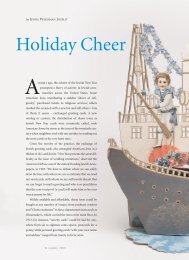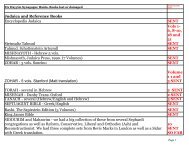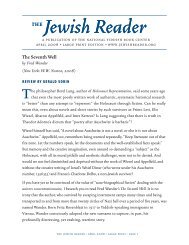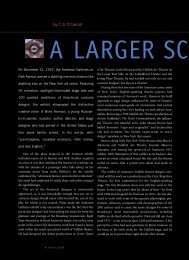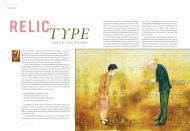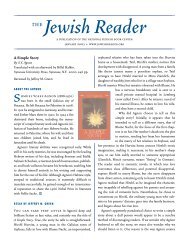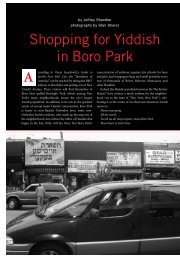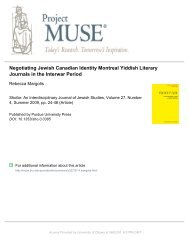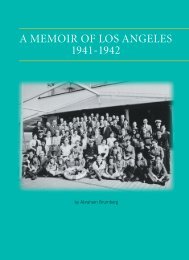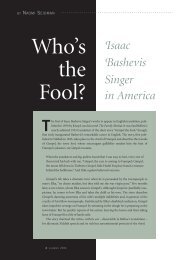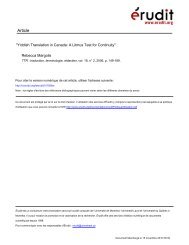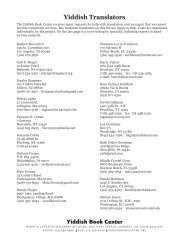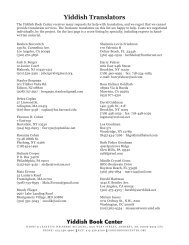Download The Jewish Reader - Yiddish Book Center
Download The Jewish Reader - Yiddish Book Center
Download The Jewish Reader - Yiddish Book Center
You also want an ePaper? Increase the reach of your titles
YUMPU automatically turns print PDFs into web optimized ePapers that Google loves.
unwilling to return to para d i s e . <strong>The</strong> whole program was<br />
enough to make you wonder: Why heaven and earth in<br />
the first place What was so remarkable about the lower<br />
w o rld that the upper should be mindful of i t, and vice<br />
v e r s a ” ( page 110)<br />
“It passes through an assortment of p a t r i a r c h s ,<br />
p r o p h e t s , and fo o l s , A d a m’s soul, entering and exiting<br />
bodies with the frequency of Ka f ka changing rental<br />
u n i t s , bodies that perish from fire, w a t e r, h u n g e r,<br />
h e a r t b r e a k, and fright. It escapes through the teeth of a<br />
captured Zealot as the Romans flay his skin with iron<br />
c o m b s , only to inhabit a bride snatched by crusaders<br />
from under her marriage canopy and violated<br />
u n s p e a ka b l y. …<strong>The</strong> soul of Adam resides eventually in<br />
Isaac Lu r i a , the Ari, magician of s i x t e e n t h - c e n t u ry<br />
S a fed…it occupies as well the earth vessel of N a c h m a n<br />
o f B ra t s l av, who hides the secret of summoning the<br />
Messiah in his beautiful stories.…For a time Adam’s<br />
soul resides in the slippery instrument of H e r s h el<br />
O s t r o p o l i e r, jester to the court of the Medzibozer<br />
r eb b e , who explains on his deathbed, ‘Not dying,<br />
dieting – I’m trying to get back to my original weight of<br />
seven pounds.’” ( page 312) JR<br />
Q U E STIONS FOR DISCUSSION<br />
1) <strong>Jewish</strong> fiction dealing with American history, such as<br />
immigrant life in New York or even the more recent<br />
history of the 1960s, tends to focus on the social and<br />
political aspects of the settings it explores. Stern’s novel,<br />
by contrast, chooses to examine these settings by<br />
blending them with legend, via the experiences of his<br />
highly imaginative characters. How does this affect our<br />
understanding of the cultural past he presents<br />
2) We often imagine that the problems we face in<br />
defining ourselves in the modern era are unique to our<br />
times. What are the connections between Saul’s search<br />
for his own identity and those of his predecessors in the<br />
novel<br />
3) One of the novel’s major themes is the breaking of<br />
sexual conventions, from Nathan and Keni’s<br />
untraditional love affair in the 1910s to Saul’s virginity<br />
in the free-love atmosphere of the 1970s to Mocky’s love<br />
for a mortal woman. Is there something about breaking<br />
rules that makes love more likely or more possible, or is<br />
that idea itself one of the myths that lead these<br />
characters to stumble<br />
4) <strong>Jewish</strong> culture has always emphasized the life of the<br />
mind, especially through reading and writing, but many<br />
of the characters in <strong>The</strong> Angel of Fo r g e t f u l n e s s find that<br />
their literary imaginations are stronger than the world<br />
can accommodate. What are the powers of literature<br />
within the novel, and what are its limitations<br />
5) <strong>The</strong> novel takes place in a series of constantly<br />
changing ad-hoc settings, from an agricultural<br />
commune to an immigrant neighborhood to an<br />
inconsistent “paradise.” What do these worlds have in<br />
common How possible is it to create a new world on<br />
the ruins of an old one<br />
6) In the novel’s ad-hoc worlds, one aspect of life that is<br />
noticeably absent is one of the staples of <strong>Jewish</strong><br />
literature: families. Instead, we find characters separated<br />
from their families, whether by force or by choice. What<br />
do these characters’ lonely paths suggest about the way<br />
life must be lived when generations can no longer<br />
communicate<br />
7) What is the power of the supernatural in this book<br />
Are there sources of mystical power available in the<br />
modern world<br />
8) What is the difference between heaven and earth<br />
Dara Horn, a doctoral candidate in Hebrew and Yi d d i s h<br />
literature at Harvard, is the author of two novels: In the<br />
I m a g e , w h i ch received a National <strong>Jewish</strong> <strong>Book</strong> Award in<br />
2003, and <strong>The</strong> Wo rld to Co m e , w h i ch will be published in<br />
J a n u a ry 2006.<br />
the<br />
<strong>Jewish</strong> <strong>Reader</strong> is a publication of the<br />
National <strong>Yiddish</strong> <strong>Book</strong> <strong>Center</strong>, Amherst, MA.<br />
E d i t o r: Nancy Sherman<br />
w w w.j e w i s h r e a d e r. o r g<br />
JR<br />
the jewish reader / october 2005 / page 3



